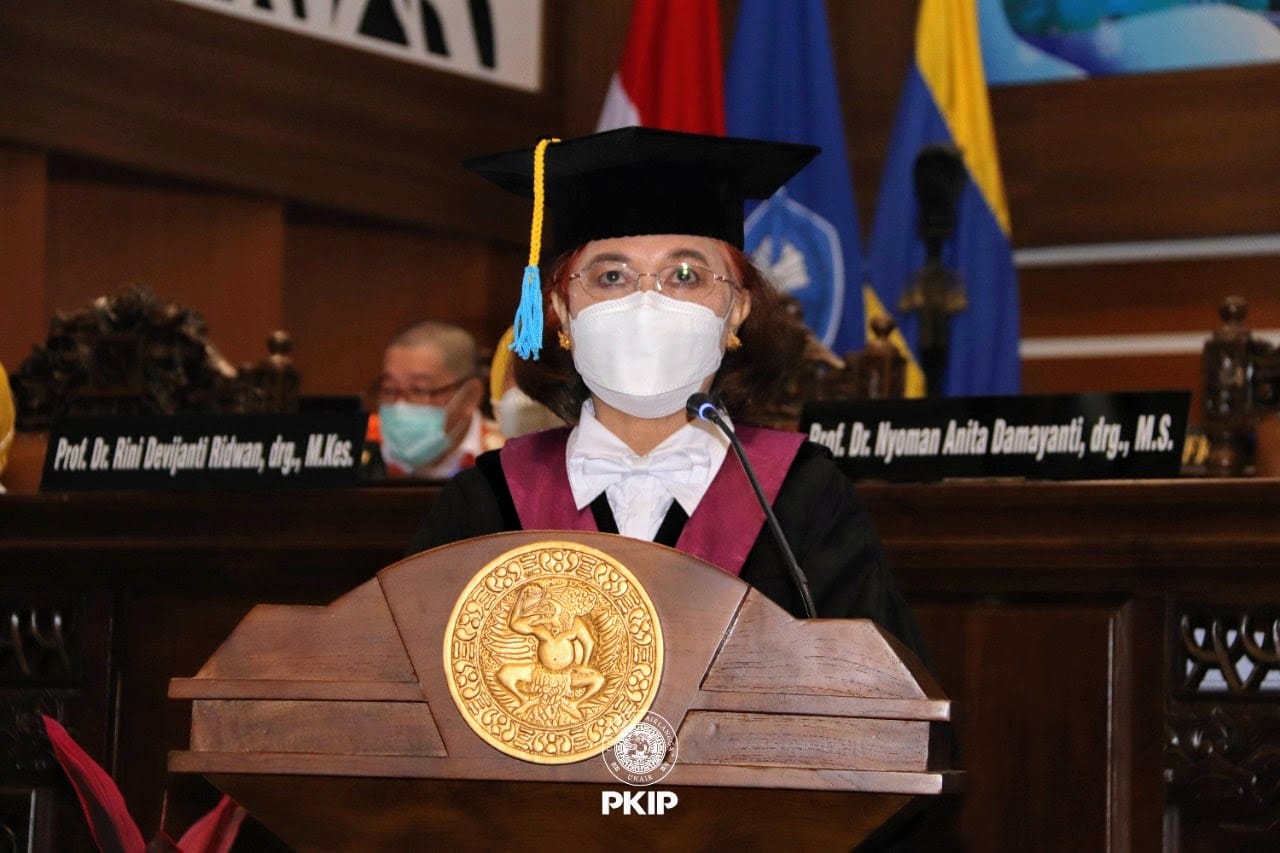UNAIR NEWS – Prof. Dr. Nyoman Anita Damayanti, drg., M.S., was officially inaugurated as the 533rd Professor of Universitas Airlangga (UNAIR) on Wednesday, December 15, 2021, in Garuda Mukti Hall, UNAIR Campus C Management Office.
On that occasion, she delivered a scientific oration on “The Power of Collaboration to Maximize the Values of Public Health Programs.” The Faculty of Public Health (FKM) professor explained that understanding the broad field of public health scientific work needs joint efforts to organize health programs and reduce maternal and infant mortality.
“Mortality of pregnant women can occur during pregnancy or within 42 days post-pregnancy (partum period) due to the handling process, not accidents or injuries,” explained Prof. Nyoman.
In addition, she added, reducing maternal and infant mortality is one of the goals in the SDGs. She explained that maternal and infant mortality is an indicator of the quality of health services, the quality of life, and even the prosperity of a nation.
“In the life cycle, the groups of pregnant women, postpartum mothers, and babies are very vulnerable to various health risks or problems. Especially amid the Covid-19 pandemic, the threat is getting higher,” said Prof. Nyoman.
Furthermore, good early detection in collaboration between the health and non-health sectors, including the community, marks the beginning of better health management for pregnant women and babies.
Empirical Evidence of the Power of Collaboration
The power of collaboration in solving maternal and infant health problems in Surabaya can be seen through collaborative mentoring activities by UNAIR academics. A variety of intellectual property attached to the entire academic community, including alumni, is a great power for an extraordinary capital to prevent maternal and infant deaths.
“In 2014, Surabaya had the highest number of maternal deaths in East Java. This condition is like an anomaly because Surabaya has various health facilities, health workers, medical laboratories, geographical access to health services which are relatively easy compared to other cities in East Java, “said Prof. Nyoman.
In addition to helping reduce maternal mortality, she said, Surabaya was named the 6th greatest contributor to reducing infant mortality in East Java in 2010-2013. From January to September 2021, she continued, there were 1,127 maternal deaths recorded in East Java. Of the 1,127 deaths, 810 people (72%) died from Covid-19, and the others were due to non-Covid-19, such as bleeding, preeclampsia, and eclampsia.
“In terms of numbers, maternal mortality in East Java has increased greatly during the peak of the Covid-19 pandemic, but on the other hand, the contribution of Surabaya to reducing maternal mortality has decreased very sharply. In 2014, Surabaya was the greatest contributor to reducing maternal mortality in East Java, but in 2021 the contribution of Surabaya dropped to rank 33,” said Prof. Nyoman.
Likewise, in terms of infant mortality, Surabaya has also dropped its rank from the top 10 contributors to the 29th contributor to infant mortality in East Java in 2020.
“Many things have been done, but the most prominent one is a collaboration with various sectors where UNAIR academics are one of them. Again, this shows the power of collaboration,” said Prof. Nyoman.
Geliat Airlangga in Collaborative Assistance
Through its motto “Continuum of Care,” since 2018, the academic community has conducted “Collaborative Assistance” to 724 pregnant women in Surabaya. A total of 614 pregnant women had successful delivery, although they have a history of various health problems, including preeclampsia. According to this data, 72 people have not given birth and are assisted in maintaining good health (data per November 2021).
“We can do many things with collaboration because it can actually create extraordinary powers beyond individual strengths. Collaboration is a very important foundation for implementing various Public Health programs for increasingly valuable results,” she concluded. (*)
Author: Muhammad Suryadiningrat
Editor : Khefti Al Mawalia





